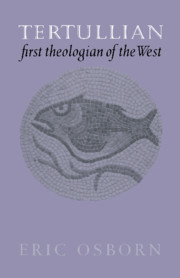Book contents
- Frontmatter
- Contents
- Preface
- Note on the text and list of abbreviations
- 1 Simplicity and perfection
- 2 The puzzle: Athens and Jerusalem
- 3 The paradox: credible because inept
- 4 Strife of opposites and faith as recognition
- 5 Antithesis in one God: ‘Against Marcion’
- 6 Trinity and christology
- 7 Prayer and the bible
- 8 Mankind's two natures and a sordid church
- 9 Argument and humour: Hermogenes and the Valentinians
- 10 Promise of laughter, judgement of hell: apocalyse and system
- 11 Ethics of conflict
- Conclusion
- Select bibliography
- Subject index
- Citations from Tertullian
- Citations from the Bible
Conclusion
Published online by Cambridge University Press: 09 November 2009
- Frontmatter
- Contents
- Preface
- Note on the text and list of abbreviations
- 1 Simplicity and perfection
- 2 The puzzle: Athens and Jerusalem
- 3 The paradox: credible because inept
- 4 Strife of opposites and faith as recognition
- 5 Antithesis in one God: ‘Against Marcion’
- 6 Trinity and christology
- 7 Prayer and the bible
- 8 Mankind's two natures and a sordid church
- 9 Argument and humour: Hermogenes and the Valentinians
- 10 Promise of laughter, judgement of hell: apocalyse and system
- 11 Ethics of conflict
- Conclusion
- Select bibliography
- Subject index
- Citations from Tertullian
- Citations from the Bible
Summary
Most thinkers write under the stimulus of controversy, and Tertullian was fortunate to have many opponents to make him think. He denied the existence of eirenic theology. Confrontation was a fact of life and the only way to maturity (Marc. 2.29.4). Life and thought for a Heraclitean (PP 211,212) were adversarial (Marc. 1.25.6). Durability in disputation clarified his opinions, for propositions are understood from the proofs which support them. Like his contemporaries in philosophy, he chose a criterion or rule of truth and used ideas which were consistent with it.
We note first the limits of his achievement. Tertullian's loyalty to his rule and to scripture, together with his desire to destroy his opponents, brought mistakes. These came when he felt a need for answers which left no remainder, a need which derived from his logic of apologetic, and from the pressures of controversy and persecution. His answer to Marcion, that justice and goodness were united in one God, pointed back to the antitheses of the Sermon on the Mount and is confirmed in the universal Christian plea for divine mercy. However, in loyalty to this answer, he went further and felt obliged to argue that only a God who inspired fear could keep sinners from sinning; love could not conquer all. Even the notorious case of the bald Elisha and the brutal bears came down to this. For any advocate could prove a difference between the badness of boys and the innocence of infants; unlike Augustine, he does not condemn the latter for original sin.
- Type
- Chapter
- Information
- Tertullian, First Theologian of the West , pp. 246 - 258Publisher: Cambridge University PressPrint publication year: 1997



